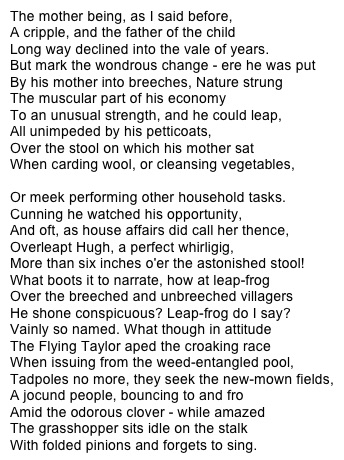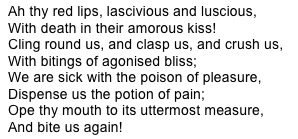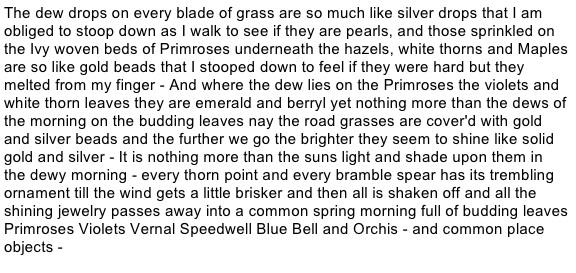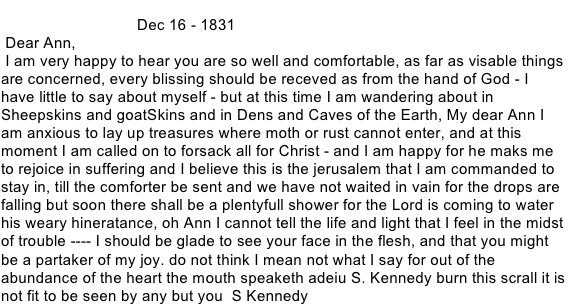selected letters 1988-1989
August 14th 1988
Dear J
The business of positing a human We which excludes the referrent I've been using not from Chomsky but as an application of the thing I worked out in On Reclaiming the Local. That as I see it tries to put forward an analysis of how language is used to deny the actual existence of others, and does so on the assumed agreement that the referrent will not and cannot read the thing describing, as that would be to step outside the behaviour pattern to the referrent ascribed. That logically leads to the sentence that the local, i.e. a mass of people, can be bombed out of existence as they were never truly in it in the first place.
I felt a fresh critical impetus stirring while in Lancaster. For the two weeks I gave no conscious thought to the anthology, reading instead mainly Lawrence's poetry, and feeling very refreshed by that to tackle again in a precise and useful way the inhabitants of the Penguin Book of Contemporary Poetry, to do the bastards once and for all. I'd be developing the telescoped points made about the anthology in the Reclaiming the Local Essay, which at least put a few torpedoes through it. It's the nature of the consciousness that the language offers itself as a model of, to which Mr Leonard finds himself returning.
Anyway. Will have to
make a Supreme Effort of the Will, or a Boiled Egg on
Toast, to get the Renfrewshire anthology finally into the
library in the next few weeks.
January 21st
1989
Dear Robert Creeley
It was good to hear
your voice, even if you did seem to hang up. To reiterate.
I finish in May at my job, after that it would simply be
as an individual unattached to money sources that I would
badger places to invite you up, were I to know that you
were going to be in England at some time. I'd be glad
enough to do that, though of course I might not succeed. I
have organised large festivals, sound-poetry ones on an
arts council budget, and several as writer in residence at
Paisley. But I'm just a fucking writer, not an impresario.
I organised two sound-poetry festivals because it seemed
like the only way that anyone in Glasgow was going to get
hearing Jandl, Ruhm or Rothenberg. It would be for the
same reason I'd get involved in trying to get you to
Glasgow. If I thought anyone else was likely to invite
you, and be more efficient at it, I'd leave it to them.
Anyway. I hope we meet up sometime. I follow your work,
closely as I can, and you helped me to where I am, even
though we're in very different places, and I had to react
strongly against you at one point, to get my own bearings
more precisely my own. Am waiting on the continuation of
the Black Sparrow letters, which seem to have stopped for
a while. Well. I don't seem to have made a great job of
our first contact. When your first letter arrived I walked
about for ages feeling really uplifted. There you
are.
March 12 1989
Dear Bob
A month by since you wrote and still I hadn't got back. Not right. Still, I have tidied up the desk and the carpet has now been hoovered. Been blundering about this past month I don't know what the hell I'm doing. Strange days in a hospital with them looking for stones in my kidneys. Yes you will be missed in May at the festival. I might do what I did once years ago at a reading that W.S. Graham couldn't make, he was in his last illness at the time. Anyway I just read out one of his poems as a gesture that he was one of the invited. Graham was a beautiful reader of his own work, especially the late stuff: I'll send you a cassette of it some time if you don't have one.
You ask me what I have of yours. Poems 50/65 Finger Hello Later Memory Gardens Grackle; Sense of Measure Gold Diggers Island, Letters with Olson 1 - 8. There's one or two things esp. Mabel I don't have, I tend to use the University Library five minutes up the road. On Collecteds. Could you tell me did Paul Blackburn's ever come out? The last statement I have on that is the publisher's note preceding your own preface to Against the Silences. There was then a selection in Sulfur 4, but that's the last I heard. Compendium Books in London couldn't come up with anything when I asked them and they're usually reliable. Would appreciate any word, though maybe I should just have written to Black Sparrow and Permanent.
At the moment on my own front I'm just waiting to hear if Edinburgh Review is still on the go, I think they are but they had difficulties moving printer. I've been doing work for them regular, they've a sequence of poems coming in the current much delayed issue, but I'm about to get down to an essay the latest in a series of exploratory things I've been doing, basically on language, though there's been essays on Reznikoff and Graham. This one I really want to link up a number of things to do with language as a model of diction rather than of lexical intensity, what I'm calling person centred versus authority centred language. To do with breath of course, and all the usual. Not academic.
Some one told me you
were preparing an edition of Burns. Be nice if that's
true, maybe you can be visiting Scotland to have a look at
some manuscripts. Your mention of Jandl and Rühm, yes
it was great having them both in Glasgow years back. Jandl
wanted straight to a pie and Guinness on arrival,
Rühm looks round the pub I took them to, says, "The
people in Glasgow they are very eh... Hogarthian." We are
indeed, some of us , which you must check out some day. Of
course the bugger Rühm is just a big peasant himself
under that hauteur. We got on fine from when we first met
at a soundpoetry thing in Amsterdam. If there's anything
you want me to do for you in Scotland, maybe a bit of
photocopying of some manuscript or whatever, I'd be
delighted to do it for you. All the best just now.
March 20th 1989
Dear Stewart,
I'm writing to you to put some initial feelers about a series I would be very interested in making for Radio Scotland, and wonder if you would be interested yourself and could find the place for it. The series would be about neglected and forgotten poetry of the West of Scotland, and I say a series rather than a programme as while writer in residence at Paisley Library I have amassed a great deal of material that would require I feel a series to do the poets justice. The material itself has been shaped into a large book, Radical Renfrew: Renfrewshire Poets from the French Revolution to the First World War, which will run to over 400 pages and is to be published sometime round the end of the year by Polygon.
The compilation of that book has been a very exciting project for me, and in the introduction to the anthology (a copy of which I can run off from my Amstrad for you if you wish) I discuss at length what has happened to poetry in Scotland since the industrial revolution that has caused a nation to wipe these poets from its memory. For the radio series I would extend the compass of the poetry beyond the strict boundaries of old Renfrewshire (which anyway actually extended from Greenock practically to the centre of Glasgow.) I could fill easily six twenty-minuters I'm sure: programmes could be compiled around: 1) David Wingate 2) Alcoholism and Domestic Life 3) Marion Bernstein and radical feminism 4) Radical Politics: Chartists and Republicans 5) Poems about work 6) Town and country.
Of course I could add a seventh about B.V. Thomson who has had some cult following over the years but is still largely unknown. I know so much from my research on him, I've sometimes swithered about doing a larger programme on him without taking it up. Anyway without going into numbers and minutes, I send this to see if you are interested at the outset. The material itself would be exciting, that I believe. There's been such bullshit about poetry in Scotland as if the nineteenth century was a kind of wasteland with Scott and Stevenson alone apart from one or two "minor poets" like Tannahill or Alexander Smith. It lends the false aura to the kind of nonsense about "Why is it there are suddenly a lot of writers in the West of Scotland" as if we have sprung up in a vaccuum.
I'm at Paisley till
the end of April. I'm working on copy dates for some
things just now, as I say this is a feeler. I'd hope, if
you can take me up on this, to be able to start work on
these matters after June - or whenever suits, if it does.
If you want me to come through and talk to you about it,
without any presumption of that meaning anything definite,
I'd be glad to. I enclose a copy of the "Guide to Themes"
thing that I have at the front of my Radical Renfrew, as
it might give an idea of the areas covered. Hope all is
well with you. All the best just now.
[The six-part radio
series “The Forgotten Voices” produced by
Stewart Conn was broadcast the following year]
June 12th 1989
Dear John,
Thanks for your letter. I'll be happy to do reviews; your interest is the more welcome as I've just finished my spell at Paisley Library.
The one area I couldn't touch would be contemporary Scottish writers, or the recent past. The place is too small, and I like to relax when I go a walk. Also I like not to know the authors of the books I express opinions about. I've been doing some review work for The Edinburgh Review this past year or so: of course you wouldn't know as their review section is anonymous. You can find examples of my reviews of e.g. Tytell's biography of Pound & the Pound-Zukofsky letters (ER 80-81); Peter Finch's poetry (ER 79-80); James Berry's anthology of Westindian British poetry News from Babylon (ER 67-68). I've last week sent off two reviews for ER 84, due late Autumn: the Faber anthology Modern Voices from Africa, and volumes 1 & 2 of the new Collected Poems of W.C. Williams from Carcanet. I've also done one on the Williams for City Limits a few weeks back.
This morning Peter Kravitz has sent me the new book of Furtwangler's notebooks 1924-54 to see if I'm interested in reviewing it. I will. Again outside of poetry etc. I've asked him to get hold of two new books from Harvard on Lacan and on the child psychoanalyst D.W.Winnicott whose theories interest me, and whom I wish to refer to in an article on "person-centred versus authority- centred language" I'm at work on for a future issue.
This last paragraph
to indicate some areas of my interest. I'll try to
indicate these as fully as possible on a separate page in
the hope that that will be of use to you, and you can then
decide for yourself. I'll be away the first two weeks in
July. I look forward to hearing from you.
p.s If you
haven't had the new OUP early Clare reviewed (£155
for the 2 vols) I'd like a go at that, though no doubt the
chance to review those will be sought after.. I see them
sitting already in John Smith's secondhand at £60.
Poetry:
American, especially the Pound-Williams-Olson etc Black
Mountain tradition. Non-standard English, i.e.
Black poetry, African, Westindian etc. Not Lallans or
urban Glasgow. Concrete, sound, so-called
"experimental" poetry in whatever form.
Nineteenth century Scottish, especially by "minor" poets,
i.e. not Sir Walter Scott.
Working-class "artisan" poetry of the nineteenth century,
from Britain or elsewhere. Other "colonial" poetry e.g.
Australian, Canadian - though again with a preference for
the under-rated, or off-the-mainstream, i.e. not Attwood,
Porter, the present Ulster establishment. Kavanagh,
Mangan, yes. In all things a bias to the existential. Of
the English canon this past couple of centuries, Crabbe,
Clare, Herrick, the early Wordsworth, Hopkins. Lawrence
the only major twentieth century English poet whose
prosody really interests me. Preferably not the
Lowell-Larkin-Heaney mainstream. Definitely not Twentieth
Century Scottish.
Novels: No novels. Of novelists, anything to do with Sterne, Swift or Beckett would be especially welcome. Biography: General literary, classical music, or politics.
Language: Anything to do with language and its relation to power, personal or national - apart that is from any specifically Scottish angle, which would be too close to my work. Books on jargon, propaganda. Dictionaries or reference books. Classical Music: Composer/musician biographies, memoirs, letters etc.
19th
Century:
Years of research on
the Port Glasgow poet James Thomson (1834- 82) has
incidentally led to much research on:-
1) Edward Irving, the Gift of Tongues movement, and the
place of millenialism in British/Scottish society. 2) The
growth of Army education & the story of Army
schoolmasters 3) Charles Bradlaugh and the story of the
secular movement (i.e Humanism, atheism, the National
Secular society) in 19th cent Britain. This research
combined with the compilation of the anthology Radical
Renfrew: Renfrewshire Poetry from the French Revolution to
the First World War (due Polygon winter 89) has meant
other areas of nineteenth century expertise are: 4) The
social history of the West of Scotland, especially with
regard to Chartism, the Temperance Movement, the 1820
rising.
Politics
Events followed closely and in detail. Any reviews of
contemporary or of
past would be from an unaligned-cum-Scottish-Republicanish
position far to the left of the Labour Party (i.e. even
further than Mr Heath).
[A series of reviews
for John Linklater at the Glasgow Herald followed while he
was literary editor, including one of the early poems of
John Clare mentioned]
June 19th 1989
Dear Carl
I took it you didn't want to sign the thing. Fair enough, I don't want to know the hinterland of it, but you were loyal to me in hospital, so I'm not going to let us be at war. I like the anthology, a good big generous swatch, with a distinct editorial policy. Good to get surprises, including stories by Galt and Hogg that I hadn't read before. I love Galt's work, things like Ringan Gilhaize, totally committed, none of your detached narrator nonsense. And the Last of the Lairds. And those wonderful chapters 19, 23-25 of The Entail. Sometimes it seems to me the whole of Scottish Literature is about a father making an utter cockup of trying to be the Old Testament God.
I will of course play the awful game of My Favourite Scottish Story You Didn't Put In, with which you will now be plagued for the rest of your life. On the bright side of it you will at least get to hear of some good stories. Mine is Davidson's "A Boy's Tragedy" - though it may be "The" - which is I think the most outraged and sustained - among many - of protests at corporal punishment in schools that you get in Scottish Literature. Anyway, aside from the anthology, it's worth looking up if you don't know it. On Hogg by the way, have you seen the Academic Press Poems and Songs? It's excellent, including a couple of his great parodies of Wordsworth. The two included were new to me, though not in the new anthology is "The Flying Tailor", which I have been fond of for years. From which an extract:

The whole thing is in J.C. Squire's anthology of parodies "Apes and Parrots". There's also in that Beerbohm's terrific parody of Bennett, "Scruts" (beginning "Emily Wrackgarth stirred the Christmas pudding till her right arm began to ache") though it doesn't have my favourite and most perceptive parody of a poet beside Hogg on Wordsworth, Hilton's parody of Swinburne, "The Octopus". "Strange beauty, eight-limbed and eight handed,/Whence camest to dazzle our eyes?" etc:

I suppose I see Honest as
a half-parody really. A half-parody of Beckett's prose
style circa 1945-52, written by someone who loves it.
Concluded by a parody of what some fellow members of the
writer's class would supposedly make of such niceties.
I'm afraid I reacted rather badly to a letter from N
that didn't seem to see what was going on, and thought
the ending "maybe unnecessary".
August 18th 1989
Dear Ronnie
I understand from Peter that you are still there, or here as it will no doubt seem to you, in Austria. Hello. I did wonder sometimes where you are after we spoke on the phone months back. Are you still working on In the Name of Love that you mentioned: the phrase kept coming back to me till I remembered Asphodel. Have you seen the new Collected Williams that New Directions/Carcanet issued? Two volumes, Paterson to come. There's a lot of stuff that wasn't in the old New Directions series that made up the Collected, though I still like the old ones for they kept a lot of poems one to a page and were printed nicely, the paper not smooth and obviously photographed as the new ones are. A strength of the new ones is that they print entire those works that mixed poetry and prose, like Spring and All, whereas the previous collections just filleted out the poems. I've been reading a lot of Clare recently, doing an article on him. As you maybe know the latest in his definitive edition from Oxford came out earlier this year, two volumes of the Collected Earlier Poems up to 1822, selling at £155 the set. I managed to get a set that was in John Smith's secondhand, some institution had ordered it then knocked it back. It's the same editors as brought out the Oxford Standard Authors one in 1984. From which:-

I find it interesting comparing this wonderful thing with a letter written by B.V. Thomson's mother that I tracked down that will be going into the book on Thomson that I have at last started to write, and will be doing this winter. She was a millenialist Irvingite as they were then called in Port Glasgow around 1830. Full of the Revelation of course and like Clare the Bible will have been her literary source:-

Years back I was reading
millenialist stuff day after day in my Thomson research.
Not always as human as the preceding. The first one to
start the tongues in 1830 in that area was Mary Campbell
of Rosneath. If they came back now they'd have a thing to
say about Colport and Faslane. Enclosed is another object
that will be in the Edinburgh Review eventually. Maybe
one or two wee alterations. Your Divided Self is
mentioned page 6. Hope you enjoy it. If six people do
I'll become an optimist.
[RD Laing
died of a heart attack while playing tennis in the south
of France on August 23rd five days after this was
written. I don’t know if he received the letter.]
